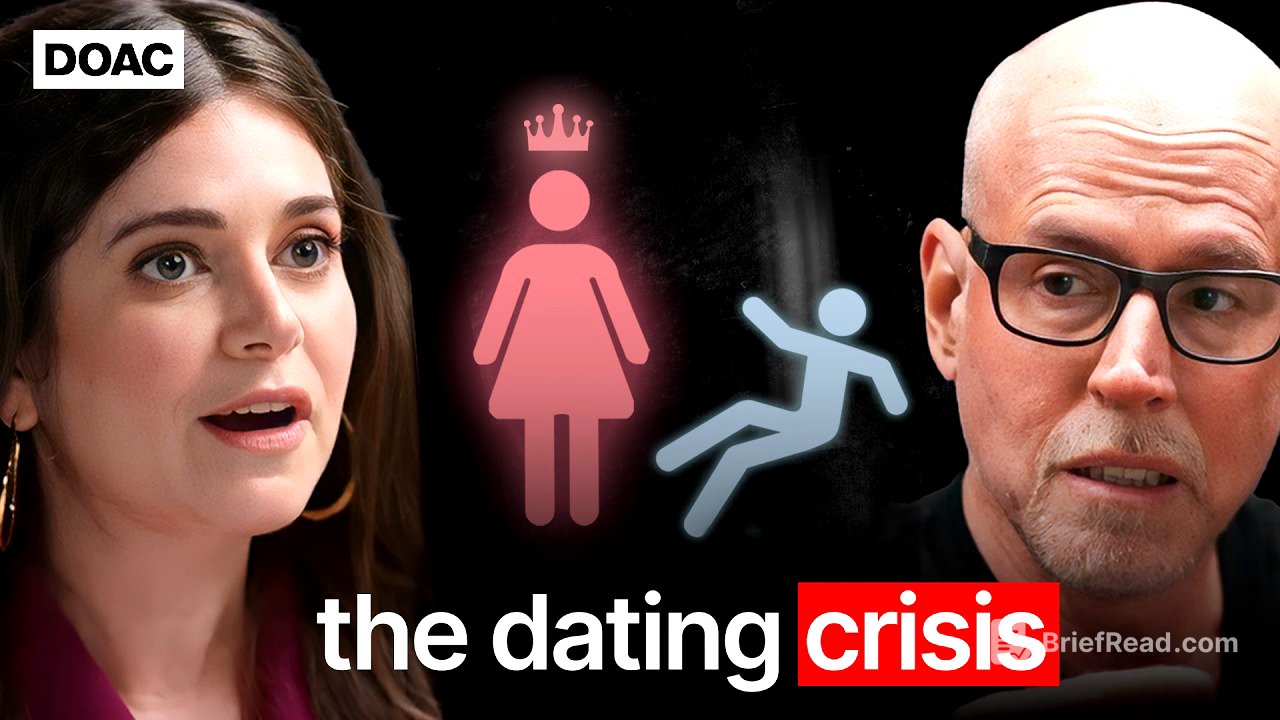TLDR;
This episode of The Diary Of A CEO addresses the struggles of young men in today's society, marked by declining education, employment, and mental health. The discussion explores the root causes, including the lack of male role models, the education system's biases, and the impact of technology and pornography. It also examines dating and relationship dynamics, the rise of feminism, and the societal pressures on men. The episode offers advice for parents, young men, and society to address these issues and promote a more balanced and supportive environment for everyone.
- The decline of young men in education and employment.
- The impact of absent fathers and lack of male role models.
- The challenges men face in dating and relationships.
- The role of societal pressures and economic factors.
- Potential solutions and advice for parents and young men.
Intro [0:00]
The host introduces a critical conversation about the struggles of young men, highlighting shocking statistics and the need to address this crisis. The discussion will cover the rise of lonely, addicted men and explore potential solutions. The host mentions a graph showing young women out-earning young men and the increasing number of males aged 16 to 24 not in education or employment. The conversation will also touch on the impact of male role models and the creation of angry, single men who feel the system is rigged against them.
The Lost Boys Report [2:03]
The Center of Social Justice released "The Lost Boys" report in March 2025, revealing struggles in education, increased suicide rates, difficulty finding stable work, and involvement in crime among young men. The report emphasizes that these issues are symptoms of deeper problems, such as a lack of guidance, discipline, and purpose. The report highlights the need to address the root causes and the emotional impact of these findings.
How Did This Happen? [6:02]
The discussion explores the primary factors contributing to the struggles of young men, with a focus on the loss of male role models. Statistics show that single-parent homes, predominantly with mothers, lead to negative outcomes for boys, including incarceration and self-harm. The lack of men in the education system and biases against males in schools are also discussed as contributing factors.
Fatherless Homes [10:27]
The conversation highlights the significant increase in young boys being raised without a father, with 25% living without a biological, step, or adoptive father. This absence leads to increased drug use, gun carrying, and mental health issues. The discussion raises concerns about male abandonment and the difficulties men face in staying involved in their children's lives due to family court and economic factors.
Are Boys Mentally Weaker? [14:29]
The discussion explores the idea that boys are emotionally and mentally weaker than girls, citing statistics that show the absence of a father figure causes depressive symptoms in boys but not girls. Young girls are more resilient in childhood, while boys are more negatively impacted by negative situations. Boys who are sexually molested are more likely to commit suicide later in life.
Is the Education System the Problem? [16:41]
The discussion explores how the education system may be failing young boys. Boys are more likely to be suspended and are often taught in environments that favor female behaviors. The decline of vocational training and the rise of computer science have left many boys without a clear path to middle-class jobs. The success of women in education is celebrated, but the need to address the challenges faced by boys is emphasized.
Where Are Male Role Models? [22:39]
The conversation addresses the lack of male involvement in children's lives, with fewer male teachers and mentors available. The absence of male role models leads to struggles for young boys, who are not finding them in work or college. The discussion emphasizes the need for society to acknowledge the importance of male involvement and to encourage men to step up and fill this void.
What the Stats Say About Dating [29:58]
The discussion reveals a reverse gender pay gap, with young women out-earning young men. This shift, combined with traditional hypergamy, creates a mating gap where high-earning women struggle to find suitable partners. Women are raising the bar for what they need from men, while men are falling behind. The lack of corporate support for women after having children also contributes to these dynamics.
Dating Standards [34:32]
The conversation explores the challenges in the dating world, where fewer men meet the hypergamous expectations of women. This leads to women competing for the same men, while many men are ignored. The rise of online dating and the use of filters, such as height, exacerbate these issues. The media's portrayal of strong, independent women who don't need imperfect men also contributes to the disconnect.
Do Women Really Want Emotionally Attuned Men? [44:13]
The discussion addresses the paradox of women wanting emotionally available men but also being attracted to traditional masculine attributes. Women state they want emotional availability, but research shows they are still attracted to traditional masculine traits. The conversation highlights the confusion in the dating world, where women are being asked to do more masculine things, and men are being asked to do more feminine things.
If They're Okay, Always Go on a Second Date [46:06]
The speakers share dating advice, particularly emphasizing the importance of going on a second date. They suggest that people should train themselves to look for slow burns and give potential partners a chance to open up. The point is that first impressions aren't everything and that some people take longer to show their true selves.
Men's Groups: Should We Have Them and What Are the Benefits? [47:56]
The conversation explores the idea of men's groups as a way to address the issues men face. These groups provide a masculine space for men to discuss their struggles, hold each other accountable, and receive advice from trusted peers. Men's groups can be a powerful way for men to change and support each other, especially given the high cost and limited availability of therapy.
Steve's Supportive Group of Friends [55:40]
The discussion highlights the importance of supportive male friendships. The speakers share personal experiences of having close-knit groups of male friends who provide emotional support and understanding. They acknowledge that many men don't have this and that it's a relatively new phenomenon. The conversation explores the evolutionary basis for men's groups and the need for in-person time with friends.
The Dangers of Porn for Young Boys [1:02:32]
The conversation addresses the negative impact of pornography on young men. Pornography takes away the desire to meet someone, demonstrate excellence, and endure rejection. The speakers discuss the rise of nofap communities and the need to modulate porn consumption. They also express concern about the replacement of human connection with technology, such as AI girlfriends and sex robots.
How Scott Helps Men With Porn Addiction [1:07:51]
The speaker shares his approach to coaching young men struggling with porn addiction. He emphasizes the importance of reinvesting time and capital into higher ROI investments, such as working out, making money, and engaging in activities with strangers. He also encourages young men to ask strangers out for coffee to build rejection resilience.
Men Approaching Women in a Post-MeToo Era [1:13:01]
The conversation explores the challenges men face in approaching women in a post-MeToo era. Men are afraid of being called creepy or being shamed online. The speakers discuss the need to allow people to shoot their shot in a non-creepy way and to teach young men how to express romantic interest while making the other person feel safe.
Teens Don’t Know How to Ask Girls Out in Person [1:15:17]
The discussion reveals that more than 50% of men between the ages of 18 and 24 have never asked a woman out in person. This is attributed to a lack of social skills and the impact of the pandemic. The speakers emphasize the need for more third spaces where people can meet and for guidance on how to express romantic interest respectfully.
Do Successful Women Struggle to Find a Partner? [1:25:11]
The conversation explores the challenges successful women face in finding partners. Men are often intimidated by their success, and there is a trend of men choosing polyamory. The speakers discuss the problems with decision paralysis and the opportunity cost of not settling down. They also address the unfair math of dating, where age is more on the side of men.
The Rise of Feminism [1:30:13]
The discussion explores the role of feminism in the issues discussed. One guest shares that the feminist movement has let men and women down in some ways. The conversation touches on the idea that women can have it all, just not at the same time. The speakers emphasize the need to balance career and family and to support both men and women in their pursuits.
Money Equals Identity for Men [1:31:53]
The conversation addresses the societal pressure on men to be economically viable. Men often define their identity and self-worth by how much money they have. The speakers discuss the need for men to be providers and protectors and the impact of economic struggles on their mental health.
Does Money Give Self-Worth to Women? [1:37:08]
The conversation explores whether money equals self-worth for women. While money may not be as strongly tied to identity for women, it does provide security. The speakers emphasize the importance of economic liberation and independence for women.
The Human Dating Boot Camp [1:39:41]
The speakers discuss what a human dating boot camp would entail. The boot camp would focus on comedy, confidence, male manners, going to the gym, entrepreneurship, and conflict resolution. The goal is to help men develop the skills and traits that make them attractive and successful in relationships.
How Is the Left Going to Get Men Back? [1:48:32]
The conversation explores how the left can regain support from men. The speakers argue that the left's vision of masculinity is not in line with what men feel is important. They criticize the conflation of masculinity with coarseness and cruelty on the right and the notion of toxic masculinity on the left. The speakers emphasize the need for a more balanced and inclusive vision of masculinity.
Advice for Parents of Young Boys [1:53:15]
The speakers offer advice for parents of young boys. They emphasize the importance of forgiving yourself, getting men involved in their lives, and providing male role models. They also encourage parents to support their sons in pursuing their interests and developing their skills.
What Scott and Steve Had to Unlearn About Being a Man [1:56:11]
The speakers share what they had to unlearn about being a man. They emphasize the importance of creating surplus value, expressing emotions, and being generous. They also discuss the need to challenge traditional notions of masculinity and to embrace a more balanced and inclusive vision.
Closing Message for the Lost Boys [2:11:01]
The speakers offer a closing message to young people. They emphasize that happiness is a smile and that the years between 20 and 45 are often full of anxiety. They encourage young people to reach out for help, forgive themselves, and build a support system. They also emphasize the importance of finding things that help them get out of a dark place and to recognize that everyone struggles.









